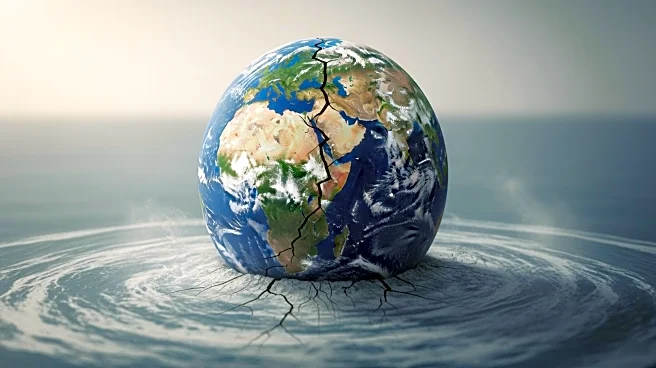What is the story about?
What's Happening?
A powerful earthquake with a magnitude of 6.9 struck the central Philippines, causing at least 69 deaths and significant damage in Cebu province. The earthquake occurred at about 10 p.m. local time, with the epicenter near Bogo city. Rescuers are using backhoes and sniffer dogs to search for survivors amidst collapsed buildings. The Philippine Institute of Volcanology and Seismology issued a brief tsunami warning, which was later lifted. The earthquake disrupted a basketball game in a sports complex, leading to several fatalities. The region is still recovering from a recent tropical storm, complicating rescue efforts.
Why It's Important?
The earthquake's impact on Cebu province highlights the challenges faced by the Philippines in managing natural disasters. The country's location on the Pacific Ring of Fire makes it susceptible to earthquakes and volcanic eruptions. The disruption of infrastructure and communication systems can hinder rescue operations and exacerbate the crisis. The event underscores the need for improved disaster preparedness and international cooperation in relief efforts. The psychological toll on residents, who have recently faced a tropical storm, is significant, emphasizing the importance of mental health support.
What's Next?
The Philippine government is considering seeking international assistance based on ongoing damage assessments. The United States, Japan, Australia, and the European Union have expressed condolences and readiness to support relief efforts. Schools and government offices in affected areas remain closed while building safety is assessed. More than 600 aftershocks have been detected, and rain-soaked mountainsides pose a risk of further landslides. The situation requires coordinated efforts to restore power and ensure the safety of structures.
Beyond the Headlines
The earthquake's occurrence on an undersea fault line highlights the need for more comprehensive geological surveys and monitoring systems in the Philippines. The event may prompt a reevaluation of building codes and disaster-resilient infrastructure, especially in areas prone to seismic activity. The psychological impact on residents, who have recently faced a tropical storm, is significant, emphasizing the importance of mental health support in disaster recovery.

















